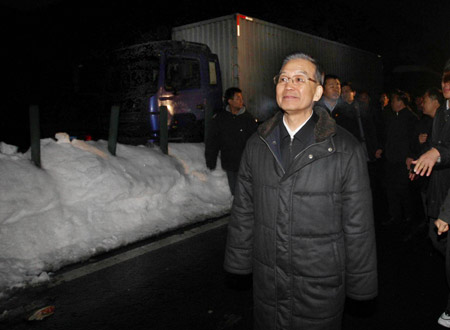Wen oversees relief work in blizzard-hit province
Chinese Premier Wen Jiabao went to the snow-ravaged Shijiazhuang City, capital of north China's Hebei Province, by train on Thursday afternoon to oversee relief work.
|
Chinese Premier Wen Jiabao (front) inspects the disaster situation at a border section between Hebei and Shanxi provinces on the Shijiazhuang-Taiyuan expressway, in north China's Hebei Province, Nov. 12, 2009. |
Noting that China was in a critical phase to deal with the global financial crisis and the A/H1N1 influenza, Wen called for stepped-up efforts to mitigate negative impacts the blizzards imposed on people's lives.
Authorities should ensure the supply of heating, gas, water, power and other necessities to the public, ease traffic jams in the cities, and strengthen monitoring and control over commodity prices in order to safeguard people's livelihood, he said.
They must also ensure supply of coal, power and fuel for production purposes, he said, adding that regions that had not been affected by the snow and blizzards so far should also make preparations for possible bad weather.
Local government should perfect their emergency plans in accordance with the changing weather conditions, and ensure proper implementation of the plans at grassroot levels.
He urged relevant authorities to cooperate with each other and do a better job when making weather forecasts.
Upon arrival in Shijiazhuang, Wen visited passengers in the waiting room of the city's railway station.
He also went to a border section of the Shijiazhuang-Taiyuan expressway between Hebei and Shanxi provinces to visit stranded passengers on the Shijiazhuang-Taiyuan expressway and to inspect the disaster situation.
The premier asked local authorities to provide food and water to the stranded passengers, and to make sure the expressway resume function as soon as possible.
Wen also visited a heating company and a supermarket in Shijiazhuang, as well as the city's police headquarters.
The safety of school buildings in primary and middle schools should be of great concern, he said.
Heavy snow and blizzards had been reported in central Shaanxi, central and southern parts of Shanxi and Hebei, northern and western parts of Henan, and in northwestern Hubei and Shandong Provinces since Nov. 8.
It was the heaviest snowfall in Shijiazhuang since 1955 when the city began to make meteorological records.
According to the Ministry of Public Security, more than 25,000 police officers and over 15,000 patrol vehicles in Hebei, Shandong, and Henan, three worst-hit provinces by the snow, had been mobilized to clear snow from the roads and to ease traffic congestion by Thursday noon.
Traffic in the above regions have basically resumed function so far, but the snow still caused a number of deadly traffic accidents and highway closures, and had left tens of thousands of people stranded at major airports and expressways.
In Hebei, thousands of vehicles stretching more than three kilometers were jammed on the Shijiazhuang-Taiyuan expressway on Thursday night.
The Ministry of Public Security and Ministry of Civil Affairs have ordered local government officials to provide food, water, blankets and clothes to all stranded passengers.
Meanwhile, the Ministry of Education on Thursday also warned relevant departments to guard against possible accidents that might result from the unfavorable weather conditions.
Four children had died and 35 injured when two school canteens in northern China collapsed in heavy snow since Wednesday.
The education ministry called on local schools to look out for fire, traffic accidents and gas poisoning, as many parts of the country still used coal-fueled furnaces for heating.
They should also guard against on-campus mass infection of the A/H1N1 flu, and could postpone or suspend school if necessary, the ministry said.
 0 Comments
0 Comments







